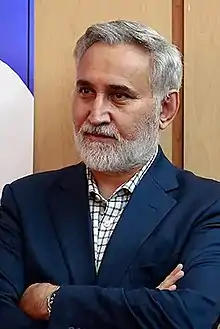Mohammad-Reza Khatami
Mohammad-Reza Khatami (Persian: محمدرضا خاتمی, born 1959) is an Iranian politician and nephrologist.
Mohammad-Reza Khatami | |
|---|---|
 Mohammad Reza Khatami in 2019 | |
| First Deputy of the Parliament of Iran | |
| In office 28 May 2003 – 28 May 2004 | |
| Preceded by | Behzad Nabavi |
| Succeeded by | Mohammad-Reza Bahonar |
| In office 28 May 2001 – 28 May 2002 | |
| Preceded by | Behzad Nabavi |
| Succeeded by | Behzad Nabavi |
| Member of the Parliament of Iran | |
| In office 26 May 2000 – 28 May 2004 | |
| Constituency | Tehran, Rey, Shemiranat and Eslamshahr |
| Majority | 1,794,365 (61.21%) |
| Personal details | |
| Born | 1959 (age 61–62) Ardakan, Iran |
| Political party | Union of Islamic Iran People Party |
| Spouse(s) | Zahra Eshraghi |
| Children | 2 |
| Parents | Ruhollah Khatami (father) Sakineh Ziaee (mother) |
| Relatives | Mohammad Khatami (brother) Ali Khatami (brother) Mohammad Reza Tabesh (nephew) |
| Alma mater | Tehran University of Medical Sciences |
Early life and education
Khatami was born in Ardakan, Iran, in 1959. He is younger brother of former president Mohammad Khatami.[1] Khatami is educated in medicine and before entering politics, he was a practicing nephrologist (kidney specialist) for a number of years. He is a faculty member of Tehran University of Medical sciences.
Career
Khatami was the first Secretary-General of the Islamic Iran Participation Front, the largest Iranian reformist party. He is now a member of the central council of the party. He is also the former deputy speaker of the Iranian parliament. He entered politics in 1997 after his brother's victory and was appointed deputy minister of health.[1]
He was elected in March 2000 for the sixth term of the Islamic Republic's parliament's election as the first representative of Tehran with 1,794,365 votes from the people of Tehran. He has also acted as the manager in charge of the now-banned reformist daily Mosharekat. Sometimes described as "ultraliberal" in his views, he was "disqualified from running for any office by the Guardian Council."[2]
Personal life
In 1983, Khatami married Zahra Eshraghi, granddaughter of Ruhollah Khomeini (founder of the Islamic republic), and an activist in women's rights.[3][4] They have two children — a daughter, Fatemeh, who at the moment studying at a university in London, and a son, Ali.
On 28 March 2020, Khatami announced he tests positive for COVID-19 with publishing a video showing he is at hospital.[5]
References
- "Profile: Mohammad Reza Khatami". BBC. 8 July 2003. Retrieved 9 October 2012.
- Majd, Hooman, The Ayatollah Begs to Differ : The Paradox of Modern Iran, by Hooman Majd, Doubleday, 2008, 197
- Sciolino, Elaine (2 April 2003). "Daughter of the Revolution Fights the Veil". The New York Times. Retrieved 9 October 2012.
- Bar, Shmuel (2004). "Iranian Defense Doctrine and Decision Making" (PDF). Institute for Policy and Strategy. Retrieved 29 July 2013.
- Former Iran deputy speaker infected with coronavirus
| Assembly seats | ||
|---|---|---|
| Preceded by Behzad Nabavi |
1st Vice Speaker of Parliament of Iran 2001–2002 2003–2004 |
Succeeded by Behzad Nabavi |
| Succeeded by Mohammad-Reza Bahonar | ||
| Preceded by Mohammad Ali Movahedi Kermani |
2nd Vice Speaker of Parliament of Iran 2000–2001 2002–2003 |
Succeeded by Mohsen Armin |
| Preceded by Mohsen Armin |
Succeeded by Behzad Nabavi | |
| Academic offices | ||
| Preceded by Mohammad-Javad Larijani |
President of the Majlis Research Center 2000–2004 |
Succeeded by Ahmad Tavakoli |
| Party political offices | ||
| New title Party established |
Secretary-General of Islamic Iran Participation Front 1997–2006 |
Succeeded by Mohsen Mirdamadi |
| Honorary titles | ||
| Preceded by Ali Akbar Nategh-Nouri |
Most voted MP for Tehran, Rey, Shemiranat and Eslamshahr 2000 |
Succeeded by Gholam-Ali Haddad-Adel |
[[Category:Iranian nephrologists]